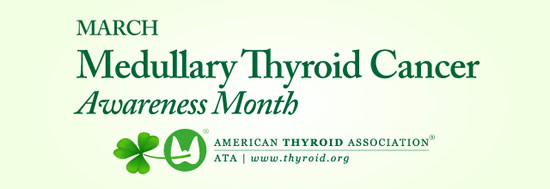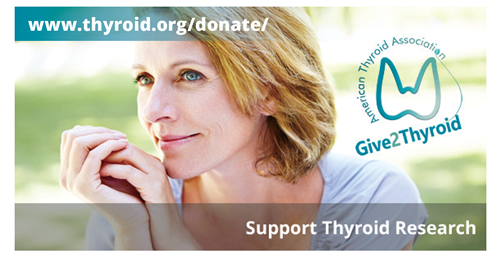Clinical Thyroidology for the Public summarizes selected research studies discussed in the previous month’s issue of Clinical Thyroidology, an official publication of the American Thyroid Association. Editor-in-chief, Alan Farwell, MD, FACE
Volume 12 Issue 3
Available in pdf format for saving and printing and Web page format for viewing online
PDF Format for Saving and Printing
Clinical Thyroidology for the Public Volume 12 Issue 3 (PDF file, 5.6 MB)
TABLE OF CONTENTS – Web Format
THYROID CANCER Fear of recurrence affects health-related quality of life in thyroid cancer patients, even a year after diagnosis
While the majority of patients with thyroid cancer do well and have an excellent prognosis, a diagnosis of cancer has many significant implications to patients. Previous studies have shown that thyroid cancer patients have decreased health-related quality of life (HRQoL) compared to the general population, and surprisingly similar to that of patients with more aggressive cancers. This study evaluated changes in HRQoL over time and the factors at diagnosis that may predict HRQoL at one-year follow up
Hedman C et al. Fear of Recurrence and View of Life Affect Health-Related Quality of Life in Patients with Differentiated Thyroid Carcinoma: A Prospective Swedish Population-Based Study. Thyroid. 2018 Oct 26;28(12):1609-1617.
(PDF File for saving and printing, 949 KB)
HYPOTHYROIDISM Symptoms strongly drive the consideration of alternative thyroid hormone-replacement options in patients with hypothyroidism
The standard treatment for hypothyroidism is levothyroxine. However, some patients are dissatisfied with their treatment and request alternative therapies. The goal of this study was to assess the opinions of these doctors regarding the issue of treatment for hypothyroidism given the availability of the guidelines, reviews and other new publications on the topic of alternative thyroid hormone therapy.
Jonklaas J et al 2018 Physician choice of hypothyroidism therapy: influence of patient characteristics. Thyroid. 2018 Oct 5. PMID: 30289349.
(PDF File for saving and printing, 618 KB)
GRAVES’ DISEASE Which factors predict the outcome of radioactive iodine therapy of Graves’ Disease?
Graves’ disease is the most common cause of hyperthyroidism in the United States. Radioactive iodine therapy has become less popular recently with more patients started on anti-thyroid drugs. Since many people still feel that radioactive iodine therapy is a good treatment for hyperthyroidism, this study was done to review the response to radioactive iodine therapy as an initial treatment for Graves’ disease, including its’ usefulness and side effects.
Aung ET et al. Predicting outcomes and complications following radioiodine therapy in Graves’ thyrotoxicosis. Clin Endocrinol (Oxf ). Epub 2018 Oct 6. PMID: 30291728.
(PDF File for saving and printing, 618 KB)
HYPERTHYROIDISM A mild risk of neonatal hyperthyroidism follows radioactive iodine therapy for Graves’ disease prior to pregnancy
Graves’ disease is caused by the patient making an antibody called TRAB that attacks and turns on the thyroid, making it overactive. TRAB is detectable in the blood of most patients with Graves’ disease and can pass through to the baby and cause hyperthyroidism after delivery in mothers with Graves’ disease. The goal of this study is to assess the risk of hyperthyroidism in newborns of mothers who were treated with radioactive iodine within 2 years before their pregnancy.
Yoshihara A et al, Incidence of neonatal hyperthyroidism among newborns of Graves’ disease patients treated with radioiodine therapy Thyroid; epub 2018 Nov-14
(PDF File for saving and printing, 617 KB)
THYROID CANCER Radioactive iodine dosing based on the radioiodine uptake and thyroglobulin levels is helpful in treating differentiated thyroid cancer
In more advanced cases of thyroid cancer, surgery is followed by a fixed dose of radioactive iodine therapy to destroy any remaining thyroid cancer cells. However, a fixed dose may be either insufficient to destroy the remaining cells or excessive, resulting in side effects. The goal of this study is to analyze the effectiveness of an individualized radioactive iodine doses on the amount of the remaining normal and cancerous thyroid tissue after the thyroid surgery
Jin Y et al 2018 Radioiodine uptake and thyroglobulin guided radioiodine remnant ablation in patients with differentiated thyroid cancer: a prospective, randomized, open-label, controlled trial. Thyroid. Epub 2018 Dec 18. PMID: 30560716.
(PDF File for saving and printing, 618 KB)
HYPOTHYROIDISM Patients with hypothyroidism adequately treated with levothyroxine have higher levels of cholesterol compared to healthy controls.
One of the objective signs in hypothyroidism is an increase in the level of cholesterol. This increase should be reversed during treatment with L-T4, with a goal of therapy decreasing TSH levels back to the normal range. The objective of this study was to determine if normalization of TSH in patients with hypothyroidism treated with L-T4 led to normalization of cholesterol levels.
McAninch EA et al. Systemic Thyroid Hormone Status During Levothyroxine Therapy In Hypothyroidism: A Systematic Review and Meta-Analysis. J Clin Endocrinol Metab. 2018 Aug 15. doi: 10.1210/jc.2018-01361
(PDF File for saving and printing, 680 KB)





